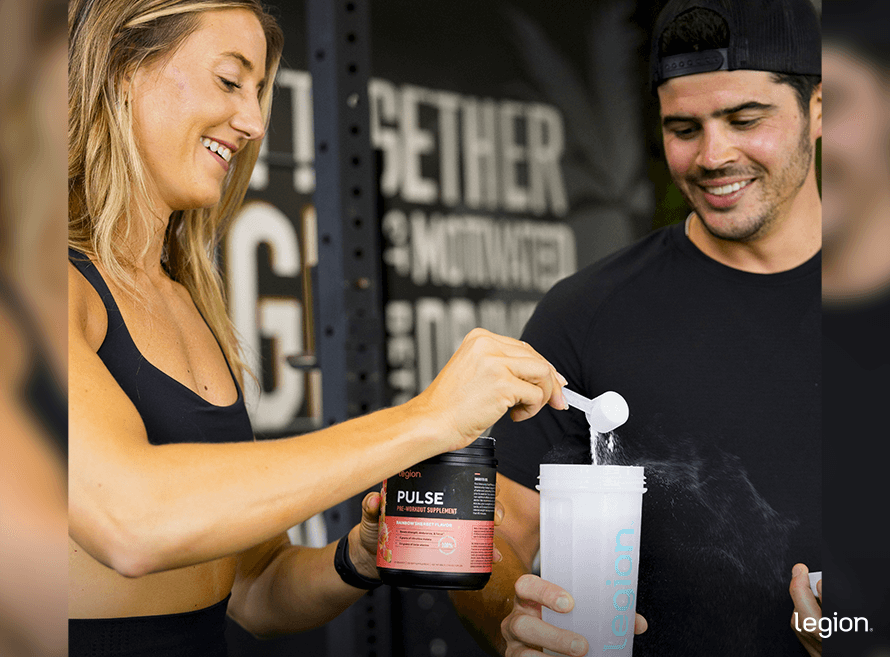
Many gymgoers think the tingling they feel after drinking pre-workout—known as “pre-workout itch”—means they’re allergic to their supplement.
They’re wrong.
That sensation comes from beta-alanine, an amino acid that boosts athletic performance but also triggers this unique reaction.
But why does pre-workout make you itch?
Is it dangerous?
And can you minimize it?
You’ll find evidence-based answers to these questions and more in this article.
Key Takeaways
- Beta-alanine is what makes you itch after taking pre-workout. It’s an amino acid that boosts athletic performance but also causes a tingling sensation in your face, neck, and hands.
- Beta-alanine itch—technically called paresthesia—happens when the compound binds to a nerve receptor called MrgprD. Scientists aren’t exactly sure why this happens, but it’s not an allergic reaction.
- The bigger the dose, the stronger and longer the itch. Smaller people taking large doses tend to feel it more intensely and for longer than larger people taking smaller doses.
- Beta-alanine itch is harmless, but whether it’s annoying or motivating depends on your perspective. Some people love it; others find it distracting.
- The sensation usually lasts 30–60 minutes. You may be able to make it less intense by taking smaller doses throughout the day, using a time-release supplement, or taking beta-alanine with food.
- For a pre-workout with clinically effective doses of beta-alanine and five other ingredients shown to increase energy, focus, strength, and stamina, try Pulse.
Table of Contents
+
What Makes You Itch in Pre-Workout?
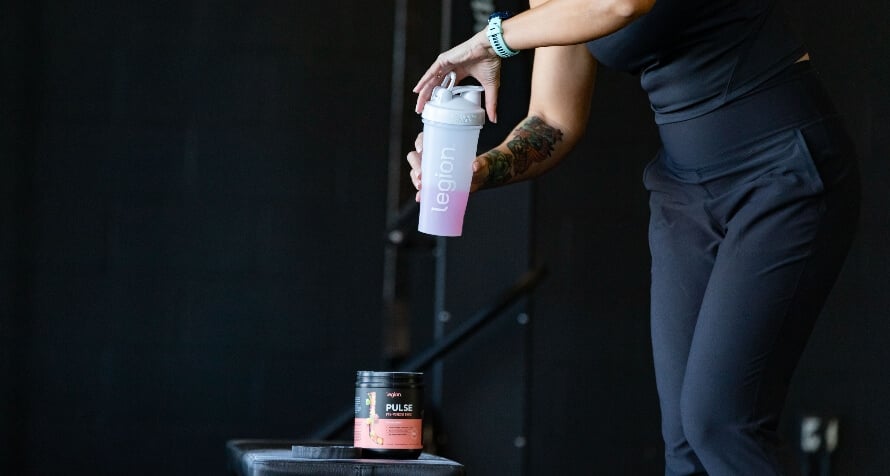
The amino acid beta-alanine is what makes you itch in pre-workout.
Most of the best pre-workout supplements contain beta-alanine because research shows it boosts endurance and reduces fatigue.
The only downside is that it commonly causes an itching or tingling sensation, usually in the face, neck, and hands, around 15 minutes after you take it. Technically, this sensation is called paresthesia, though people usually refer to it as “beta-alanine itch.”
READ MORE: The Definitive Guide to Beta-Alanine Supplementation
Should You Worry About Pre-Workout Itch? Quick Symptom Check
Not sure if what you’re feeling is normal? This quick chart helps you tell whether your sensation is typical pre-workout itch (also called “beta-alanine itch”) or something else.
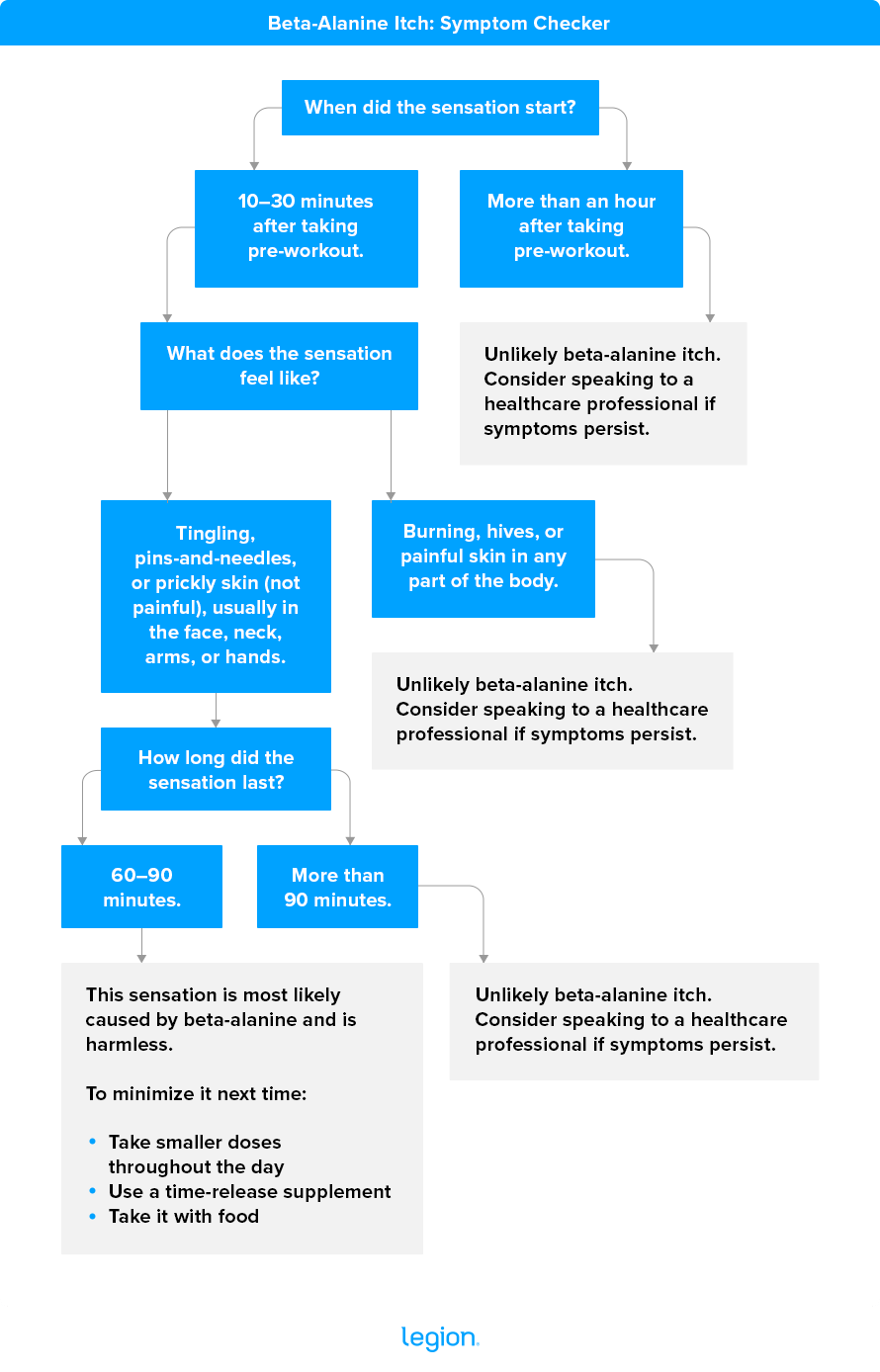
Why Does Pre-Workout Make You Itch?
Scientists aren’t sure why beta-alanine itch occurs, but the most likely explanation is that it happens when beta-alanine binds to a nerve receptor called Mas-related G protein-coupled receptor D (MrgprD).
How much beta-alanine you take and how high levels peak in your blood determine how strong you’ll experience the itch. A large dose in a smaller person will raise blood levels more than a small dose in a larger person, making the itch more intense and longer-lasting.
Some evidence also suggests that women, Asians, and those that weigh less than 165 pounds are more likely to experience beta-alanine itch than others.
Is Beta-Alanine Itch Harmful?
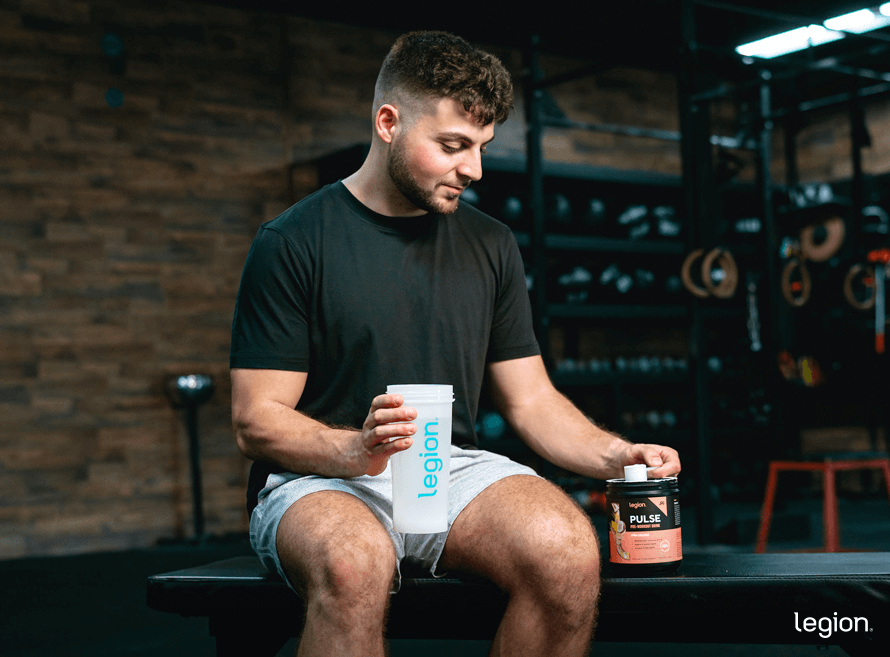
Beta-alanine itch is harmless.
That said, some people find it so uncomfortable that focusing on training or competing becomes challenging. On the other hand, some take it as a sign their pre-workout is “kicking in,” which can boost motivation—and maybe even performance.
In other words, whether pre-workout itch feels like a nuisance or a boost comes down to perspective. The only way to know how it affects you is to try it.
How Long Does Beta-Alanine Itch Last?
Beta-alanine itch usually lasts around 30 minutes, though it may last up to an hour if you take a large dose. The sensation usually becomes less noticeable after a few weeks of regular use, but it rarely goes away entirely.
That doesn’t mean beta-alanine stops working, though. Beta-alanine works by increasing carnosine levels in your muscles over the course of weeks and months, so it doesn’t wear off during a workout the same way a stimulant like caffeine might.
In other words, beta-alanine’s effects last much longer than the itch.
How to Get Rid of Pre-Workout Itch
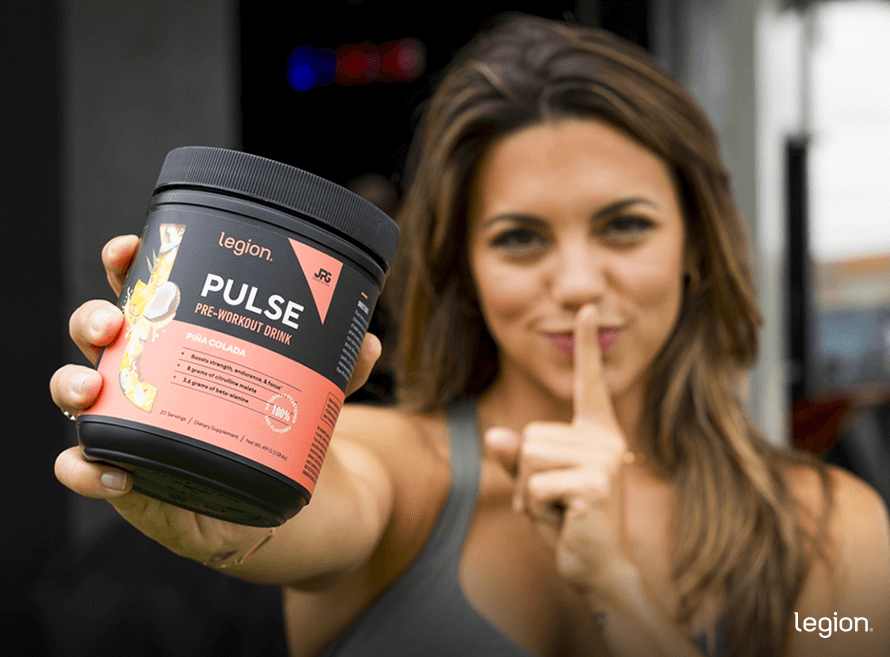
There’s no way to get rid of pre-workout itch—you simply have to wait for the symptoms to fade on their own. However, if you dislike the sensation and would prefer to minimize it, there are a few things you can try:
1. Take small doses throughout the day.
For example, instead of consuming 4.8 grams at once, you could consume 1.2 grams in four doses several hours apart throughout the day.
(This is often what researchers do in studies so that people don’t realize they’re taking beta-alanine.)
2. Take a time-release supplement.
Some beta-alanine supplements use coated capsules that dissolve slowly, which can help prevent beta-alanine itch. However, they’re usually more expensive and only contain beta-alanine—not the full mix of performance-enhancing ingredients found in pre-workout supplements.
3. Take beta-alanine with food.
Similar to time-release capsules, this slows the absorption of beta-alanine and prevents blood levels from rising high enough to irritate your nerves.
The Bottom Line on Why Pre-Workout Makes You Itch
The itching you feel after taking pre-workout isn’t an allergic reaction—it’s beta-alanine activating nerve receptors that make your skin feel prickly.
While some people enjoy the sensation because it feels like their pre-workout is working, others find it annoying or distracting. Either way, it’s completely harmless and fades within about an hour.
To minimize beta-alanine itch, you can take smaller doses throughout the day, use a time-release supplement, or take beta-alanine with food.
And if you want a pre-workout with clinically effective doses of beta-alanine and five other ingredients shown to increase energy, focus, strength, and stamina, try Pulse.
FAQ #1: Is beta-alanine itch a sign of an allergy?
No, beta-alanine itch isn’t an allergic reaction. Beta-alanine likely binds to the MrgprD receptor, which is “histamine-independent” (it doesn’t involve histamine). In other words, your pre-workout isn’t triggering an allergy—it’s activating your nerves.
That said, because of how beta-alanine itch feels, many people assume their supplement is affecting their skin or even causing acne breakouts. To learn why that isn’t the case, check out this article:
Does Pre-Workout Cause Acne? What Science Says
FAQ #2: When should you take beta-alanine?
Unlike many pre-workout ingredients, which kick in soon after you take them, beta-alanine’s effects are cumulative in nature. That is, it takes several weeks for it to increase carnosine levels in your muscles enough to improve your performance.
So, as long as you consume the clinically effective dose every day, it doesn’t matter when you consume beta-alanine.
There are a couple of riders to this rule:
- If pre-workout itch fires you up, take beta-alanine about 30 minutes before your workout.
- If you dislike beta-alanine itch, take it with food to reduce the sensation.
FAQ #3: What’s the best pre-workout with beta-alanine?
To be considered the best pre-workout with beta-alanine, a product must:
- Contain a clinically effective dose of beta-alanine
- Contain no artificial fillers, food dyes, or other chemical junk
- Be analyzed for purity and potency in an accredited lab
- Have a clean and transparent label showing exactly what’s in every serving and what’s not (no proprietary blends or hidden ingredients)
- Be made in NSF-certified and FDA-inspected and cGMP-compliant facilities
For a product that meets all these criteria, try Pulse.
Want More Content Like This?
Check out these articles:
- Can You Mix Creatine With Pre-Workout for Better Gains?
- Pre-Workout vs. Energy Drink: Which Is Best for You?
- How to Choose the Best Stim-Free Pre-Workout Supplement
Scientific References +
- Liu, Q., et al. “Mechanisms of Itch Evoked by -Alanine.” Journal of Neuroscience, vol. 32, no. 42, 17 Oct. 2012, pp. 14532–14537, www.ncbi.nlm.nih.gov/pmc/articles/PMC3491570/, https://doi.org/10.1523/jneurosci.3509-12.2012. Accessed 28 Mar. 2019.
- Hill, C. A., et al. “Influence of β-Alanine Supplementation on Skeletal Muscle Carnosine Concentrations and High Intensity Cycling Capacity.” Amino Acids, vol. 32, no. 2, 28 July 2006, pp. 225–233, pubmed.ncbi.nlm.nih.gov/16868650/, https://doi.org/10.1007/s00726-006-0364-4.
- Stout, J. R., et al. “Effects of β-Alanine Supplementation on the Onset of Neuromuscular Fatigue and Ventilatory Threshold in Women.” Amino Acids, vol. 32, no. 3, 30 Nov. 2006, pp. 381–386, https://doi.org/10.1007/s00726-006-0474-z.
- Varanoske, Alyssa N., et al. “Comparison of Sustained-Release and Rapid-Release β-Alanine Formulations on Changes in Skeletal Muscle Carnosine and Histidine Content and Isometric Performance Following a Muscle-Damaging Protocol.” Amino Acids, vol. 51, no. 1, 12 July 2018, pp. 49–60, https://doi.org/10.1007/s00726-018-2609-4.
- Kelly, Vincent. “β-Alanine: Performance Effects, Usage and Side Effects.” British Journal of Sports Medicine, vol. 52, no. 5, 5 Sept. 2017, pp. 311–312, espace.library.uq.edu.au/view/UQ:465955/s3315814_phd_thesis.pdf, https://doi.org/10.1136/bjsports-2017-098025. Accessed 30 May 2021.
- GLENN, Jordan M., et al. “Effects of Acute Beta-Alanine Supplementation on Anaerobic Performance in Trained Female Cyclists.” Journal of Nutritional Science and Vitaminology, vol. 61, no. 2, 2015, pp. 161–166, https://doi.org/10.3177/jnsv.61.161. Accessed 26 Nov. 2019.
- Harris, R. C., et al. “The Absorption of Orally Supplied β-Alanine and Its Effect on Muscle Carnosine Synthesis in Human Vastus Lateralis.” Amino Acids, vol. 30, no. 3, 24 Mar. 2006, pp. 279–289, link.springer.com/article/10.1007/s00726-006-0299-9, https://doi.org/10.1007/s00726-006-0299-9.
- Bellinger, Phillip M., and Clare L. Minahan. “Performance Effects of Acuteβ-Alanine Induced Paresthesia in Competitive Cyclists.” European Journal of Sport Science, vol. 16, no. 1, 30 Jan. 2015, pp. 88–95, https://doi.org/10.1080/17461391.2015.1005696. Accessed 11 July 2020.
- Ávila-Gandía, Vicente, et al. “One-Week High-Dose β-Alanine Loading Improves World Tour Cyclists’ Time-Trial Performance.” Nutrients, vol. 13, no. 8, 25 July 2021, p. 2543, https://doi.org/10.3390/nu13082543. Accessed 14 Sept. 2021.
- Décombaz, Jacques, et al. “Effect of Slow-Release β-Alanine Tablets on Absorption Kinetics and Paresthesia.” Amino Acids, vol. 43, no. 1, 3 Dec. 2011, pp. 67–76, https://doi.org/10.1007/s00726-011-1169-7. Accessed 1 Mar. 2019.
- Hobson, R. M., et al. “Effects of β-Alanine Supplementation on Exercise Performance: A Meta-Analysis.” Amino Acids, vol. 43, no. 1, 24 Jan. 2012, pp. 25–37, www.ncbi.nlm.nih.gov/pmc/articles/PMC3374095/, https://doi.org/10.1007/s00726-011-1200-z.










